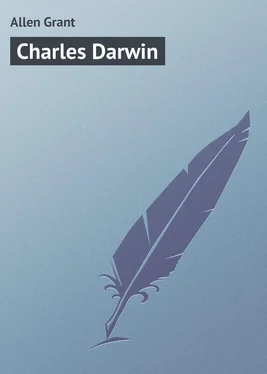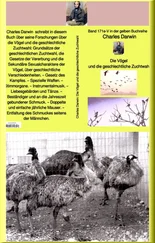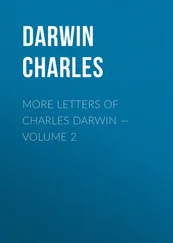Grant Allen - Charles Darwin
Здесь есть возможность читать онлайн «Grant Allen - Charles Darwin» — ознакомительный отрывок электронной книги совершенно бесплатно, а после прочтения отрывка купить полную версию. В некоторых случаях можно слушать аудио, скачать через торрент в формате fb2 и присутствует краткое содержание. Жанр: foreign_prose, на английском языке. Описание произведения, (предисловие) а так же отзывы посетителей доступны на портале библиотеки ЛибКат.
- Название:Charles Darwin
- Автор:
- Жанр:
- Год:неизвестен
- ISBN:нет данных
- Рейтинг книги:4 / 5. Голосов: 1
-
Избранное:Добавить в избранное
- Отзывы:
-
Ваша оценка:
- 80
- 1
- 2
- 3
- 4
- 5
Charles Darwin: краткое содержание, описание и аннотация
Предлагаем к чтению аннотацию, описание, краткое содержание или предисловие (зависит от того, что написал сам автор книги «Charles Darwin»). Если вы не нашли необходимую информацию о книге — напишите в комментариях, мы постараемся отыскать её.
Charles Darwin — читать онлайн ознакомительный отрывок
Ниже представлен текст книги, разбитый по страницам. Система сохранения места последней прочитанной страницы, позволяет с удобством читать онлайн бесплатно книгу «Charles Darwin», без необходимости каждый раз заново искать на чём Вы остановились. Поставьте закладку, и сможете в любой момент перейти на страницу, на которой закончили чтение.
Интервал:
Закладка:
After eighteen memorable days spent with unceasing delight at Bahia, the 'Beagle' sailed again for Rio, where Darwin stopped for three months, to improve his acquaintance with the extraordinary wealth of the South American fauna and flora. Collecting insects was here his chief occupation, and it is interesting to note even at this early period how his attention was attracted by some of those strange alluring devices on the part of the males for charming their partners which afterwards formed the principal basis for his admirable theory of sexual selection, so fully developed in the 'Descent of Man.' 'Several times,' he says, 'when a pair [of butterflies], probably male and female, were chasing each other in an irregular course, they passed within a few yards of me; and I distinctly heard a clicking noise, similar to that produced by a toothed wheel passing under a spring catch.' In like manner he observed here the instincts of tropical ants, the habits of phosphorescent insects, and the horrid practice of that wasp-like creature, the sphex, which stuffs the clay cells of its larvæ full of half-dead spiders and writhing caterpillars, so stung with devilish avoidance of vital parts as to be left quite paralysed yet still alive, as future food for the developing grubs. Cases like these helped naturally to shake the young biologist's primitive faith in the cheap and crude current theories of universal beneficence, and to introduce that wholesome sceptical reaction against received dogma which is the necessary ground-work and due preparation for all great progressive philosophical thinking.
In July they set sail again for Monte Video, where the important question of climate and vegetation began to interest young Darwin's mind. Uruguay is almost entirely treeless; and this curious phenomenon, in a comparatively moist sub-tropical plain-land, struck him as a remarkable anomaly, and set him speculating on its probable cause. Australia, he remembered, was far more arid, and yet its interior was everywhere covered by whole forests of quaint indigenous gum-trees. Could it be that there were no trees adapted to the climate? As yet, the true causes of geographical distribution had not clearly dawned upon Darwin's mind; but that a young man of twenty-three should seriously busy himself about such problems of ultimate causation at all is in itself a sufficiently pointed and remarkable phenomenon. It was here, too, that he first saw that curious animal, the Tucutuco, a true rodent with the habits of a mole, which is almost always found in a blind condition. With reference to this singular creature, there occurs in his journal one of those interesting anticipatory passages which show the rough workings of the distinctive evolutionary Darwinian concept in its earlier stages. 'Considering the strictly subterranean habits of the Tucutuco,' he writes, 'the blindness, though so common, cannot be a very serious evil; yet it appears strange that any animal should possess an organ frequently subject to be injured. Lamarck would have been delighted with this fact, had he known it, when speculating (probably with more truth than usual with him) on the gradually acquired blindness of the Aspalax, a gnawer living under the ground, and of the Proteus, a reptile living in dark caverns filled with water; in both of which animals the eye is in an almost rudimentary state, and is covered by a tendinous membrane and skin. In the common mole the eye is extraordinarily small but perfect, though many anatomists doubt whether it is connected with the true optic nerve; its vision must certainly be imperfect, though probably useful to the animal when it leaves its burrow. In the Tucutuco, which I believe never comes to the surface of the ground, the eye is rather larger, but often rendered blind and useless, though without apparently causing any inconvenience to the animal: no doubt Lamarck would have said that the Tucutuco is now passing into the state of the Aspalax and Proteus.' The passage is instructive both as showing that Darwin was already familiar with Lamarck's writings, and as pointing out the natural course of his own future development.
For the two years from her arrival at Monte Video, the 'Beagle' was employed in surveying the eastern coast of South America; and Darwin enjoyed unusual opportunities for studying the geology, the zoology, and the botany of the surrounding districts during all that period. It was a suggestive field indeed for the young naturalist. The curious relationship of the gigantic fossil armour-plated animals to the existing armadillo, of the huge megatherium to the modern sloths, and of the colossal ant-eaters to their degenerate descendants at the present day, formed one of the direct inciting causes to the special study which produced at last the 'Origin of Species.' In the Introduction to that immortal work Darwin wrote, some twenty-seven years later, 'When on board H.M.S. "Beagle" as naturalist, I was much struck with certain facts in the distribution of the organic beings inhabiting South America, and in the geological relations of the present to the past inhabitants of that continent. These facts, as will be seen in the latter chapters of this volume, seemed to throw some light on the origin of species – that mystery of mysteries, as it has been called by one of our greatest philosophers.' And in the body of the work itself he refers over and over again to numberless observations made by himself during this period of rapid psychological development – observations on the absence of recent geological formations along the lately upheaved South American coast; on the strange extinction of the horse in La Plata; on the affinities of the extinct and recent species; on the effect of minute individual peculiarities in preserving life under special circumstances; and on the influence of insects and blood-sucking bats in determining the existence of the larger naturalised mammals in parts of Brazil and the Argentine Republic. It was the epoch of wide collection of facts, to be afterwards employed in brilliant generalisations: the materials for the 'Origin of Species' were being slowly accumulated in the numberless pigeon-holes of the Darwinian memory.
Among the facts thus industriously gathered by Darwin in the two years spent on the South American coast were several curious instincts of the cuckoo-like molothrus, of the owl of the Pampas, and of the American ostrich. A few sentences scattered here and there through this part of the 'Naturalist's Journal' may well be extracted in the present place as showing, better than any mere secondhand description could do, the slow germinating process of the 'Origin of Species.' In speaking of the toxodon, that strange extinct South American mammal, the young author remarks acutely that, though in size it equalled the elephant and the megatherium, the structure of its teeth shows it to be closely allied to the ruminants, while several other details link it to the pachyderms, and its aquatic peculiarities of ear and nostril approximate it rather to the manatee and the dugong. 'How wonderfully,' he says, 'are the different orders, at the present time so well separated, blended together in different points of the structure of the toxodon.' We now know that unspecialised ancestral forms always display this close union of peculiarities afterwards separately developed in distinct species of their later descendants.
Still more pregnant with evolutionism in the bud is the prophetic remark about a certain singular group of South American birds, 'This small family is one of those which, from its varied relations to other families, although at present offering only difficulties to the systematic naturalist, ultimately may assist in revealing the grand scheme, common to the present and past ages, on which organised beings have been created.' Of the agouti, once more, that true friend of the desert, Darwin notes that it does not now range as far south as Port St. Julian, though Wood in 1670 found it abundant there; and he asks suggestively, 'What cause can have altered, in a wide, uninhabited, and rarely visited country, the range of an animal like this?' Again, when speaking of the analogies between the extinct camel-like macrauchenia and the modern guanaco, as well as of those between the fossil and living species of South American rodents, he says, with even more prophetic insight, 'This wonderful relationship in the same continent between the dead and the living will, I do not doubt, hereafter throw more light on the appearance of organic beings on our earth, and their disappearance from it, than any other class of facts.' He was himself destined in another thirty years to prove the truth of his own vaticination.
Читать дальшеИнтервал:
Закладка:
Похожие книги на «Charles Darwin»
Представляем Вашему вниманию похожие книги на «Charles Darwin» списком для выбора. Мы отобрали схожую по названию и смыслу литературу в надежде предоставить читателям больше вариантов отыскать новые, интересные, ещё непрочитанные произведения.
Обсуждение, отзывы о книге «Charles Darwin» и просто собственные мнения читателей. Оставьте ваши комментарии, напишите, что Вы думаете о произведении, его смысле или главных героях. Укажите что конкретно понравилось, а что нет, и почему Вы так считаете.












